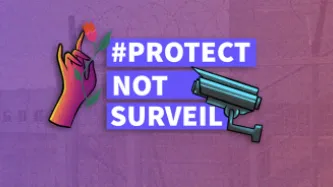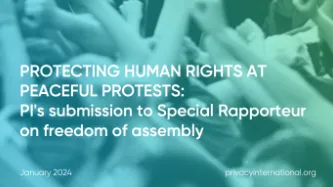Search
Content type: Advocacy
Why the EU AI Act fails migration
The EU AI Act seeks to provide a regulatory framework for the development and use of the most ‘risky’ AI within the European Union. The legislation outlines prohibitions for ‘unacceptable’ uses of AI, and sets out a framework of technical, oversight and accountability requirements for ‘high-risk’ AI when deployed or placed on the EU market.
Whilst the AI Act takes positive steps in other areas, the legislation is weak and even enables dangerous systems in the…
Content type: Advocacy
Privacy International has joined several UK civil society organisations from across sectors in expressing our deep concerns regarding the financial surveillance powers proposed in the UK Data Protection and Digital Information Bill (DPDI Bill). Specifically outlined in Clause 128 and Schedule 11, these measures introduce mass algorithmic surveillance aimed at scrutinizing bank and third-party accounts to purportedly detect welfare fraud and errors. In other words, the Department for Work…
Content type: Advocacy
Privacy International had suggested the Human Rights Committee consider the following recommendations for the UK government:Review and reform the IPA 2016 to ensure its compliance with Article 17 of the ICCPR, including by removing the powers of bulk surveillance;Abandon efforts to undermine the limited safeguards of the IPA 2016 through the proposed Investigatory Powers Amendment Bill;Refrain from taking any measures that undermine or limit the availability of encrypted communications or other…
Content type: Advocacy
BackgroundThe Snowden revelations and subsequent litigation have repeatedly identified unlawful state surveillance by UK agencies. In response, the UK Parliament passed the highly controversial Investigatory Powers Act 2016 (IPA), which authorised massive, suspicionless surveillance on a scale never seen before, with insufficient safeguards or independent oversight.Privacy International led legal challenges to this mass surveillance regime both before and after the Act became law. The Act…
Content type: Report
This policy paper seeks to determine the potential for the existing international private military and security companies (PMSCs) regulatory framework to support more effective regulation of surveillance services provided by the private sector.In order to achieve this, and given that this paper addresses an issue that is at the intersection of two domains, it seeks to establish a common language and terminology between security sector governance and surveillance practitioners.In…
Content type: Examples
A coalition of 33 civil rights, disabilities, privacy, and education advocacy groups are pushing the state of Florida to stop developing the Florida Schools Safety Portal, a database of detailed information about students for the claimed purpose of preventing school shootings, calling it a "massive surveillance effort". Governor Ron DeSantis has backed the database, which has been delayed since early 2019, when it was intended to become operational. The groups complain that the planned database…
Content type: Examples
A new report finds that monitoring software is in wide use in US K-12 schools, and that teachers, parents, and students generally believe the benefits outweigh the risks while still expressing some privacy and equity concerns. The authors recommend transparency, data minimisation, and mitigation of inequitable results stemming from this monitoring. The authors also recommend that schools should retain control of the data and build capacity within the school system and surrounding communities as…
Content type: Examples
Months after a District Court judgment that Cleveland State University violated student privacy in requiring the use of an online proctoring service that required a scan of students' rooms, some professors California colleges were still using such software for remote exams. Privacy rights campaigners argue that the software is invasive and discriminatory and a violation of the Fourth Amendment; e-proctoring companies reply that the data they collect is limited.Article: California colleges use…
Content type: Examples
New research shows that schools' scramble to adopt new technologies in schools have given for-profit companies a massive opening into the data of young people's everyday lives and created an $85 billion industry that has brought security and privacy risks for all concerned. Schools, meanwhile, lack the resources and knowledge to manage security vulnerabilities. Article: Edtech gives technology companies portal into students' lives Publication: LA School ReportWriter: Mark Keierleber…
Content type: Examples
The New York State Department of Education has prohibited schools in New York State from purshasing or using facial recognition technology. Schools can use other types of biometric identifying technology as long as they consider the privacy implications. Article: New York State bans facial recognition in schoolsPublication: New York State Education DepartmentWriter: NYSED
Content type: Advocacy
Privacy International (PI), Big Brother Watch (BBW), StopWatch, CopWatch, Defend Digital Me, Liberty and Statewatch have written to Home Secretary James Cleverly to raise concerns over the danger posed to UK society by Facial Recognition Technology (FRT).In a letter sent on 18 January 2024, the signatories raised concerns over the escalating use of FRT and warned the Home Secretary that "The indiscriminate use of this dystopian biometric technology to identify people in public spaces is a form…
Content type: People
Sana is an Advocacy Officer at Privacy International where she works on the strategic areas ‘Demanding State Accountability’ and ‘Dignity’. Before joining PI, Sana led the Policy and Advocacy team at Justice Project Pakistan, where she engaged in domestic and international advocacy to reform the criminal justice system in areas including the death penalty, prison reform, torture, and consular protection. In the past, she has led the litigation team at Justice Project Pakistan, supported…
Content type: Advocacy
Privacy International's response to the call of submissions of the UN Special Rapporteur on the rights to freedom of peaceful assembly and of association on the tools and guidelines which may assist law enforcement in promoting and protecting human rights in the context of peaceful protests. The Special Rapporteur's report will be presented at the 55th session of the UN Human Rights Council.While PI recognises the role of law enforcement can play in facilitating the enjoyment of freedom of…
Content type: Long Read
18th December is International Migrants Day. It’s a day designated by the United Nations, dedicated to recognising the “important contribution of migrants while highlighting the challenges they face.”On this day we wish to recognise in particular the countless human rights violations that people experience at borders and within hostile immigration systems. We thank those who survive these violations for sharing with us and others their experiences of such violations, and for accepting to…
Content type: Advocacy
Privacy International joined civil society efforts to call the South African Parliament not to approve the draft General Intelligence Laws Amendment Bill 2023 (GILAB), which was approved by the Cabinet and introduced in Parliament.
The Bill was proposed by the South African government, after the Constitutional Court found the Regulation of Interception of Communications Act of 2002 (RICA) unconstitutional on multiple grounds.
The draft Bill fails to meet the human rights standards on many…
Content type: Advocacy
Content type: Long Read
Our world is undergoing a seismic process of increasing digitisation, which sees the proliferation of new technologies and the growing integration of these technologies into public services, which rely more and more on copious amounts of personal data and on automated processes. This phenomenon has a unique impact upon the rights of persons with disabilities. As the era of global digitisation causes societies worldwide to undergo a digital metamorphosis, persons with…
Content type: Advocacy
The European Commission proposed the PWD in December 2021 with the objective to improve the working conditions in platform work. In February 2023 and June 2023 respectively, the European Parliament and the Council reached their respective positions, with trilogue negotiations beginning in July 2023.
PI welcomes the PWD as a mechanism to protect workers’ rights in response to transformations in the workplace, specifically with regard to the growing adoption of algorithmic management systems and…
Content type: Advocacy
In the last few years, electoral processes and related activities have undergone significant changes, driven by the development of digital technologies.The use of personal data has redefined political campaigning and enabled the proliferation of political advertising tailor-made for audiences sharing specific characteristics or personalised to the individual. These new practices, combined with the platforms that enable them, create an environment that facilitate the manipulation of opinion and…
Content type: Long Read
TAKE ACTION TO STOP THE END OF PRIVACY IN PUBLIC1. IntroductionThe use of facial recognition technology (FRT) by law enforcement and private companies in public spaces throughout the UK is on the rise. In August 2023, the government announced that it is looking to expand its use of FRT, which it considers “an increasingly important capability for law enforcement and the Home Office”. The indiscriminate use of this dystopian biometric technology to identify individuals in public spaces is a form…
Content type: Advocacy
Dejusticia, Fundación Karisma, and Privacy International submitted a joint stakeholder report on Colombia to the 44th session of the Universal Periodic Review at the UN Human Rights Council.Our submission raised concerns regarding the protection of the rights to freedom of expression and opinion, to privacy, and to personal data protection; the shutdown of civil society spaces; protection of the right to protest; and protection of the rights of the Venezuelan migrant and refugee population.…
Content type: Long Read
IntroductionData about our health reveals some of the most sensitive, intimate - and potentially embarrassing - information about who we are. Confidentiality is, and has always been, at the very heart of medical ethics. People need to be able to trust their doctors, nurses and other healthcare providers so that they are not afraid to tell them something important about their health for fear of shame, judgement or social exclusion.It’s no surprise then that data protection regimes around…
Content type: Long Read
Introduction
The 28th of September marks International Safe Abortion Day. It remains a day necessary to mobilise and raise awareness of the continued struggles women and girls face when accessing reproductive healthcare, including access to safe abortion. Across the world, abortion continues to be criminalised, restricted and in some places under attack. All of which constitute severe obstacles for women and girls to fully exercise their human rights, particularly their right to privacy, which…
Content type: Advocacy
Content type: Examples
Numerous video clips from Amazon's in-van driver-facing surveillance cameras are appearing on Reddit in violence of Amazon's stated privacy policies and raising questions about drivers' privacy. The videos are clearly not being posted by drivers themselves, but come from inside Amazon delivery partners, though who is posting them is unknown. The cameras capture all aspects of drivers road behaviour; the company claims they protect road safety. Drivers say they do not have access to the videos.…
Content type: Press release
Today the European Court of Human Rights held the United Kingdom accountable for its digital spying, even when that spying affects people outside of the UK’s borders.In this case, Mr Wieder and Mr Guarnieri, both researchers who work on information security and privacy, challenged the lack of access to redress mechanisms for alleged breaches to their rights to privacy and freedom of expression by UK intelligence agencies before the European Court of Human Rights.Mr Wieder and Mr Guarnieri…
Content type: Advocacy
Our submission focussed on the evolving impacts of (i) automated decision-making, (ii) the digitisation of social protection programmes, (iii) sensitive data-processing and (iv) assistive technologies in the experiences and rights of people with disabilities.We called on the OHCHR to:Examine the impact that growing digitisation and the use of new and emerging technologies across sectors has upon the rights of persons with disabilities;Urge states to ensure that the deployment of digital…
Content type: Advocacy
Our submission focused on (1) the ways in which states are adopting data-intensive ID systems; (2) the adoption by national immigration enforcement agencies of other privacy-intrusive modes of surveillance and control, including tracking by way of 24/7 Global Positioning System (GPS) technology and mobile device data extraction; (3) how the intensification of border surveillance technologies facilitates further human rights violations; (4) the impact of border externalisation and transfer of…
Content type: Long Read
Why does this decision matter?
Our complaint against Criteo formed part of a larger set of coordinated complaints we filed in 2018 against 7 data brokers (Acxiom, Oracle), AdTech companies (Criteo, Quantcast, Tapad), and credit referencing agencies (Equifax, Experian) with data protection authorities in France (CNIL), Ireland, (DPC) and the UK (ICO). The EU General Data Protection Regulation (GDPR) had recently come into force, and the AdTech industry was (and still is) a prime affront to the…






















